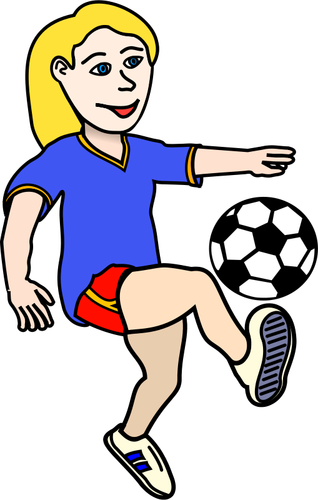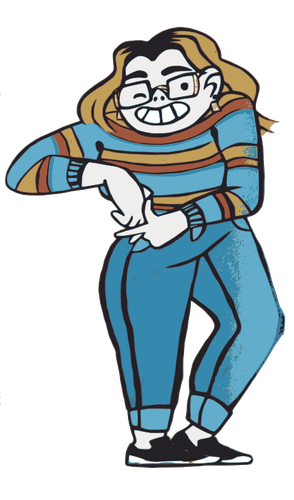19 Section 2-4: Stem-changing Verbs
2.4: Stem-changing verbs
You learned in Chapter 1 how to conjugate sein, haben, and regular verbs. Although sein and haben are irregular and must be memorized, regular verbs have the same endings. Here they are below as a review.
|
ich→-e |
wir→–en (same as infinitive) |
|
du→ –st |
ihr→ -t |
|
er/sie/es→ -t |
sie/Sie→ -en (same as infinitive) |
Try Dr. Claudia Kost’s and Crystal Sawatzky’s (University of Alberta) verb review before moving on.
In Chapter 1, you also learned how to describe the weather with adjectives. To review conjugation of regular verbs, here are a few verbs that you can use to describe the weather.

Es regnet. (Audio courtesy of Jeuwre, Creative Commons Attribution-Share Alike 4.0 International.)
Ex. A: Wie ist das Wetter? Using the weather verbs above, write several complete sentences for each day of the weather forecast below, including the day. Remember—the verb must always be in second position. As a review, also use the adjectives you learned in Chapter 2.
|
Montag |
Dienstag |
Mittwoch |
Donnerstag |
Freitag |
Samstag |
Sonntag |
|
|
|
|
|
|
|
|
|
15° C |
24° C |
19° C |
3° C |
12° C |
-2° C |
9° C |
Beispiel: Es regnet am Montag. (Am Montag regnet es.) Es ist wolkig. Wir haben 15 Grad. Es ist kühl…usw.

LISTENING PRACTICE: Listen to the description of the weather and fill in the blanks with the missing words. (Audio used by permission from germanlistening.com.)
![]()
LISTENING PRACTICE: Listen to Johanna (AudioLingua) describe the weather. This clip is more challenging, but you will hear several weather words and new weather verbs that you just learned. Make notes about what you hear.
- Wetter
- Temperatur
- Jahreszeit (season)
Some verbs in German have a stem change. This means that we will need to change a vowel in the stem as well as putting on the regular endings that you learned in Chapter 1 from the chart on the previous page.
|
Verb: spielen |
|
|
STEM |
ENDING |
|
spiel- |
–en |
For example, the verb tragen, to wear, or to carry, is a stem-changing verb that changes its stem from a to ä.
Unser Onkel trägt ein T-shirt und eine Jeans.
Du trägst einen Pulli in blau.
When conjugating, we put on the regular ending –t AND change the vowel in the stem to ä.
Here is a list of verbs that undergo a vowel change from a to ä.
|
Stem-changing verbs: a→ä |
| tragen—to wear |
|
fahren—to drive |
|
laufen—to run, walk fast |
|
schlafen—to sleep |
|
halten—to stop, to halt |
The conjugation of laufen, for example, would look like this.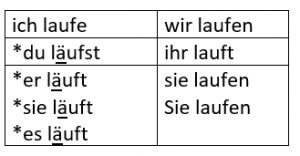 Notice that ONLY the du and er/sie/es form change their stems. Everything else stay the same as a regular conjugation.
Notice that ONLY the du and er/sie/es form change their stems. Everything else stay the same as a regular conjugation.
⇒PRONUNCIATION of äu: [äu] makes the same sound as [eu]; it is pronounced similar to the English “oi,” as in “foil” or “boil.”
The other a to ä stem-changing verbs are conjugated similarly.
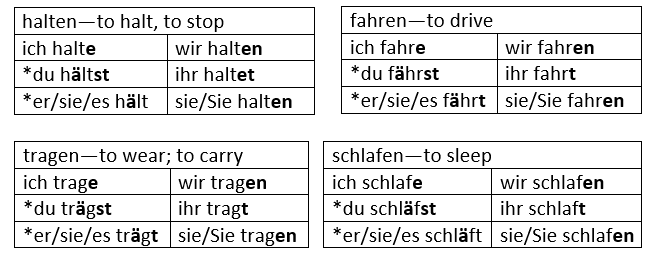
Listen to the two audio clips to compare the pronunciation of “ich fahre” without an Umlaut to “er fährt” with an Umlaut.
(Audio courtesy of Wikimedia user Jeuwre, Creative Commons Attribution-Share Alike 4.0 International.)
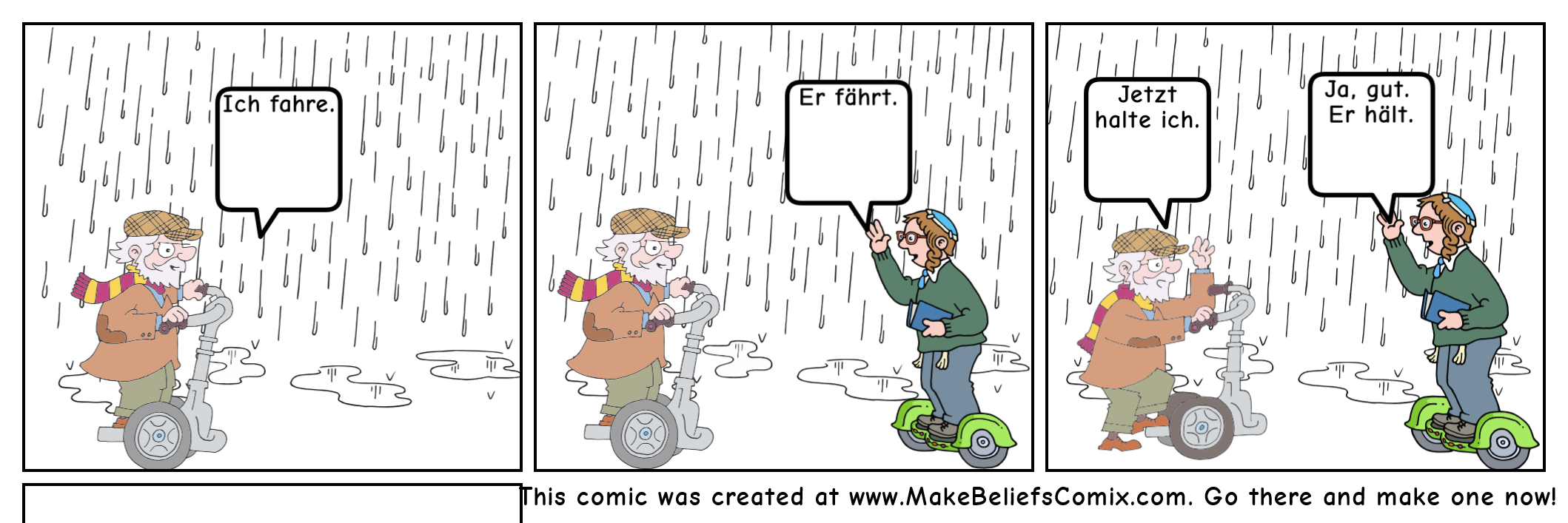
Video. Click to see me reteaching this.
Fahren vs. gehen. The German language is slightly more specific when it comes to driving vs. walking. The verb gehen, which you learned in Chapter 1, means “to walk or to go by foot.” It would sound strange to describe the following picture as “Die Katze geht.”

Die Katze fährt.
Since the car has no feet, it is better to use the verb fahren. Use fahren with cars, bicycles, and most modes of transportation. Notice the difference in gehen and fahren in the following exchange between two exchange students and a bus driver. (TRUE STORY!)
- Studentin 1: I don’t speak German. Ask the bus driver if this bus is going into town.
- Studentin 2: Entschuldigung. Geht dieser Bus in die Stadt?
- Busfahrer: Nein, leider nicht.
- Studentin 2: (Turns to Studentin 1) No, it’s not going into town.
- Busfahrer: Junge Dame, junge Dame! (Motions to Studentin 2) Dieser Bus geht nicht. Er hat keine Füße. Er fährt. Und ja, er fährt in die Stadt.
Or Student 2 could have also asked, “Wohin fährt dieser Bus?” (Where is this bus driving/going?) The main point is, that she should have used the stem-changing verb fahren instead of gehen.
(Audio courtesy of Jeuwre, Creative Commons Attribution-Share Alike 4.0 International).
Video: Watch Easy German’s video to see lots of examples using the verb fahren. At the 2:20 mark, the video gets into past tense, which we will not do until GR 102, but if you’re feeling brave, watch the rest!
Video. Watch Easy German’s video to see lots of examples using the verb gehen.
Ex. B: Fahren, gehen, oder laufen? Using the pictures below, decide whether it would be best to use the verb fahren, gehen, or laufen to describe the action. Then write a complete sentence, conjugating the verb for the subject. Remember—fahren and laufen are stem-changing verbs; gehen is not.
Beispiel:  →Der Mann läuft.
→Der Mann läuft.
 6.
6. 
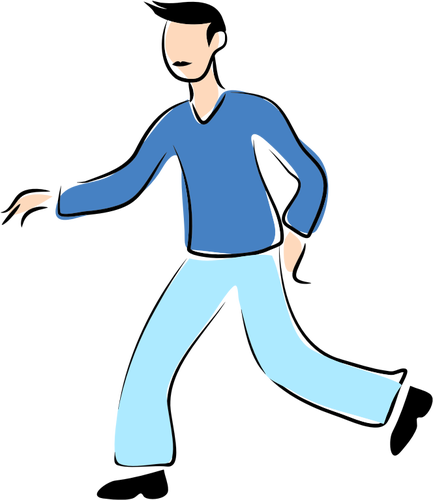 7.
7. 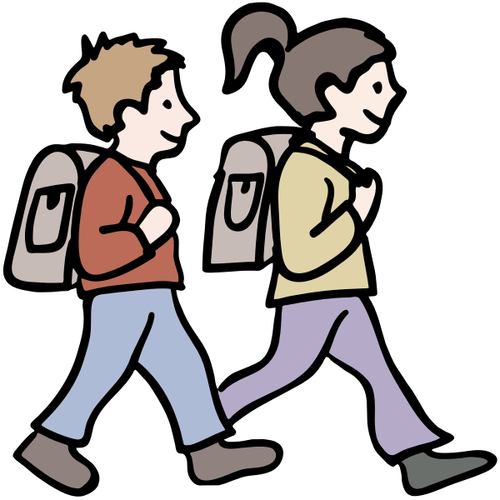
 8.
8. 
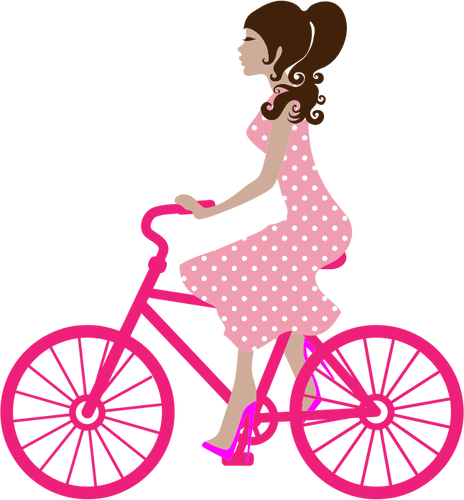 9.
9. 
 10.
10. 
Ex. C: Wie lange schläfst du? With a partner, ask each other the following questions. Then answer in a complete sentence.
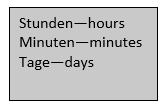
- Wie lange schläfst du am Montag?
- Wie lange schläfst du am Wochenende?
- Wie lange schläfst du im Sommer?
- Wie lange schläfst du bei der Arbeit?
Clothing: Below is a list of clothing that you can use with the verb tragen to describe what you are wearing.
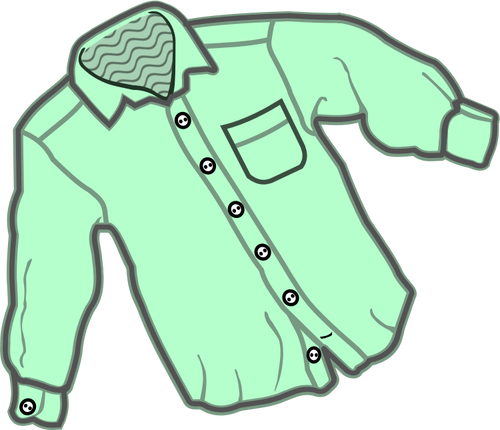
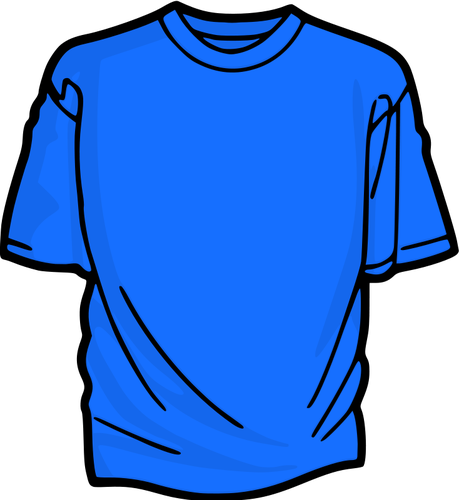
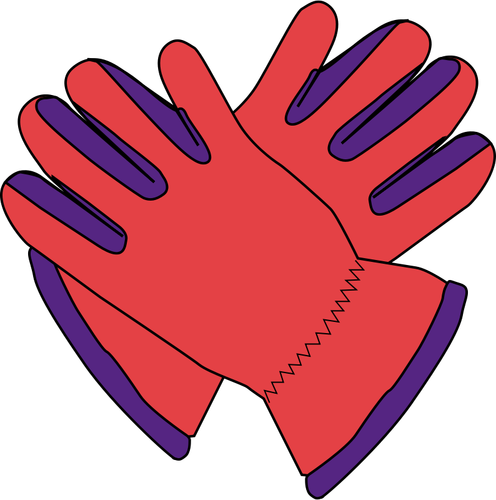

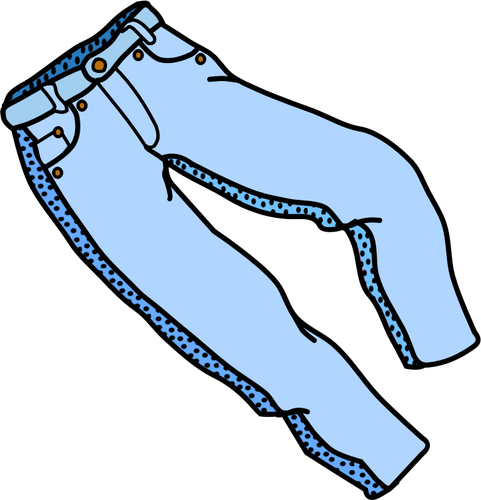
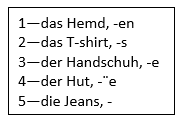
1 2 3 4 5
![]()
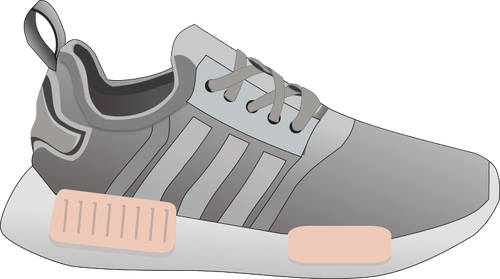
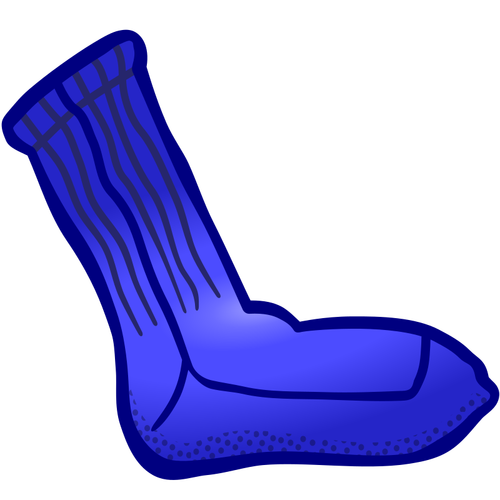


6 7 8 9



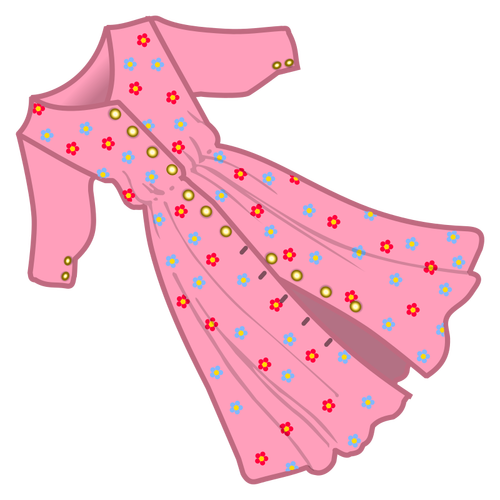
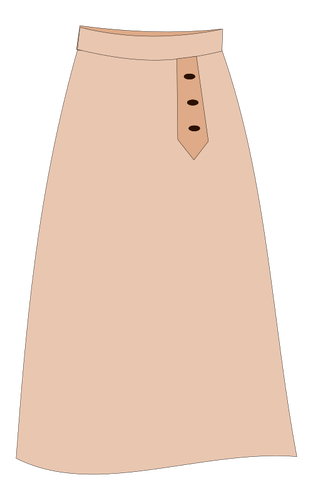
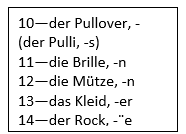
10 11 12 13 14

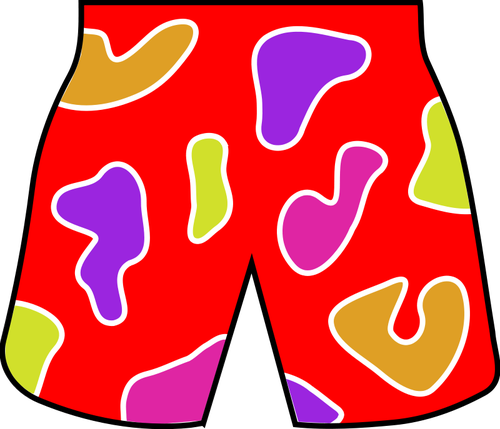


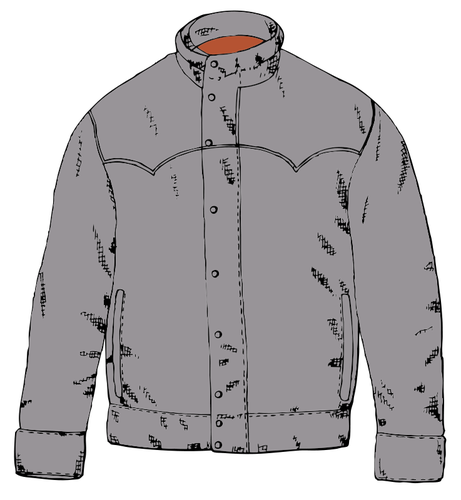
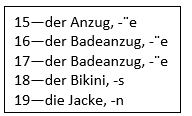
15 16 17 18 19

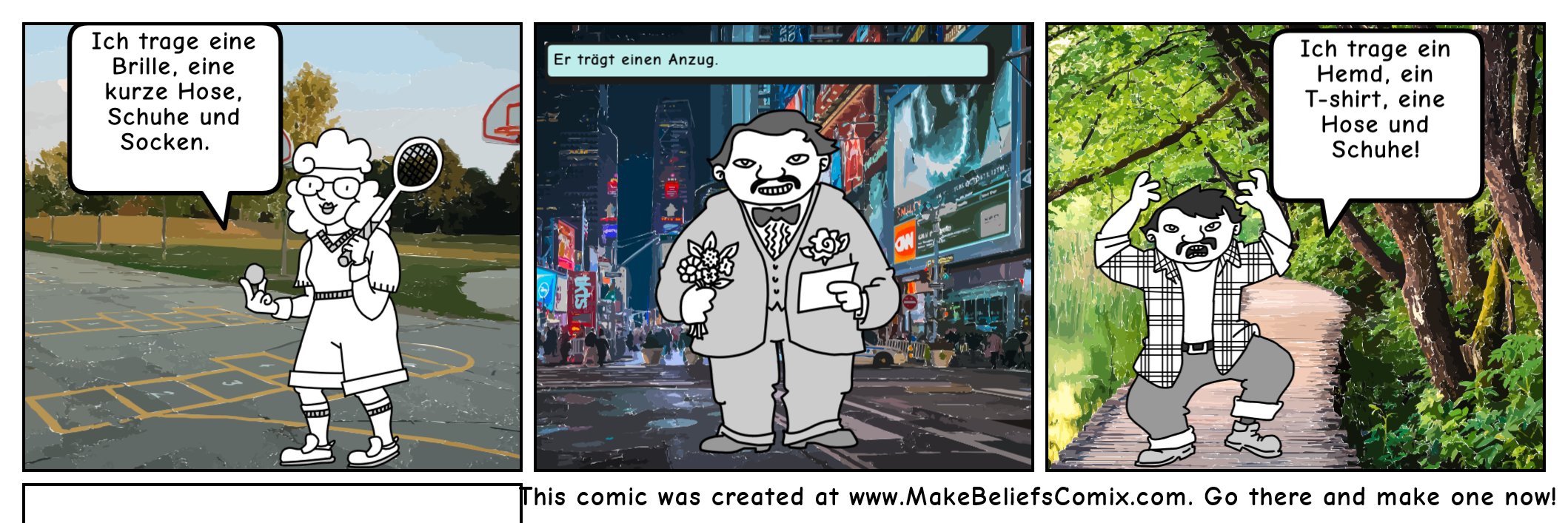
Ex. D: Was trägst du heute? Don’t forget to put the articles of clothing that you are wearing in the accusative case. Masculine will get an extra -n. You may need to determine whether the item you are wearing is singular or plural.
Ich trage heute ________, _________ und _________.

Brandon trägt eine Lederhose, ein Hemd, Socken und Schuhe. Er spielt Tuba.
Ex. E: Was tragen diese Leute? Answer using a complete sentence.
Beispiel: ![]() →Er trägt einen Anzug und Schuhe.
→Er trägt einen Anzug und Schuhe.
Extra Practice with Claudia Kost’s and Crystal Sawatzky’s exercise (University of Alberta.)
Video. Watch Easy German’s video to hear clothing vocabulary in super slow German.
Ex. F: Was tragen Sie im Frühling? Read each situation and answer the questions about it in complete sentences.
- Es schneit, und wir haben -3°. Was trägst du?
- Das Wetter ist windig, und es regnet. Was trägst du?
- Die Sonne scheint, und wir haben 25°. Was trägst du?
- Es ist Frühling, und das Wetter ist warm. Was trägst du?
- Du gehst schwimmen. Was trägst du?
- Du arbeitest. Was trägst du?
- Es ist Sommer und sehr heiß. Was trägst du?
- Es ist November in Alabama. Was trägst du?
- Es ist April, und du gehst zur Universität. Was trägst du?
There is also a set of verbs that have a stem change from “e” to “i”/”ie.”
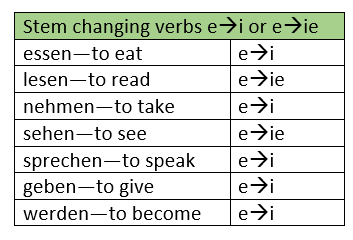
They are conjugated exactly like the stem-changing verbs that changed from “a” to “ä.” The conjugation of essen is as follows.
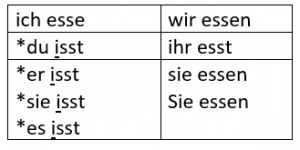
Notice that when conjugating for du, (iss + st), we don’t end up with issst. Limit it to only two of the letter s.
Here are the rest of the e to i stem-changing verbs with conjugations.
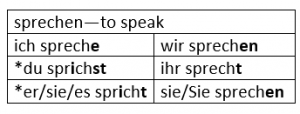



The verbs sehen and lesen stem-change from „e“ to „ie.“

Video. Click to watch me and Lingoni German reteaching this.
Check out Dr. Claudia Kost’s and Crystal Sawatzky’s (University of Alberta) diagram of more freetime activity examples using the stem-changing verbs you have just learned.
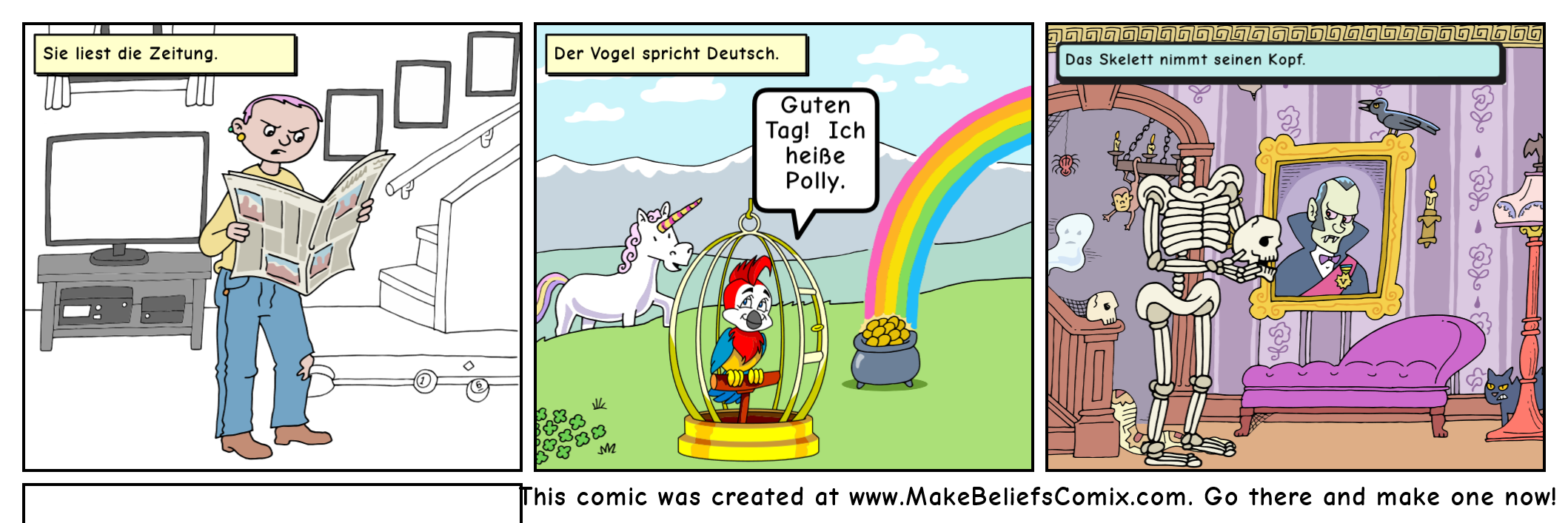
Ex. H: Was isst er gern? Tell what the following people like to eat based on the prompts.
Beispiel: Tobias 
→Tobias isst gern Fritten.
Alternative: (Tobias isst gern Pommes frites.)
- du
 2. unser Vater
2. unser Vater 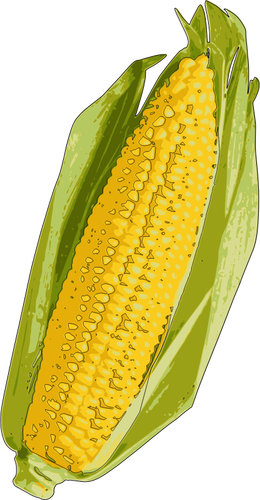
3. wir 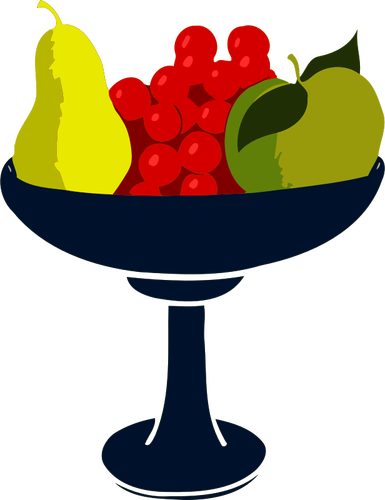 4. ich
4. ich 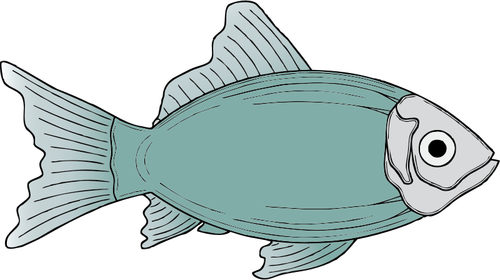
5. ihr 6. der Onkel
6. der Onkel 
LESEN: Here are several things that can be read.
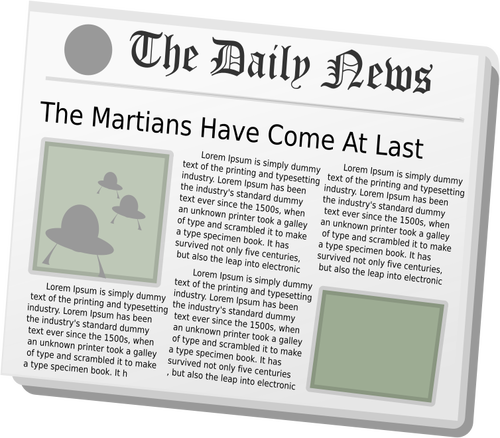
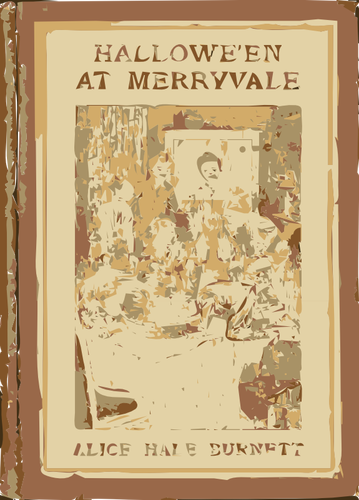
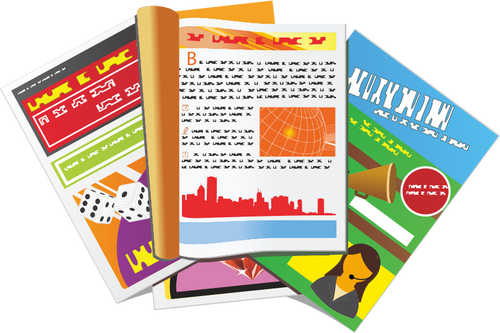
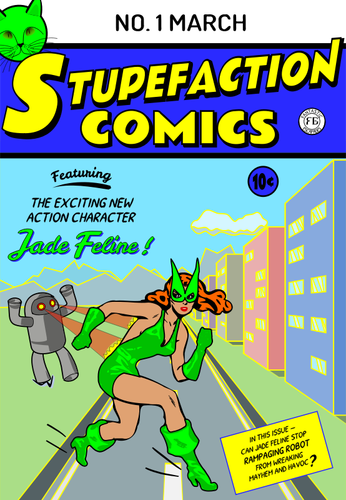
1 2 3 4
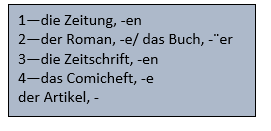
Ex. I: Partnerarbeit. Take turns asking your classmates if they are reading the following items. Answer in complete sentences. Don’t forget to put the direct object, aka the thing being read, in the accusative case.
A: Liest du __das Buch___?
B: Ja, ich lese das Buch.
If you don’t read the thing that you’re asked about, negate the sentence by putting nicht after the direct object.
B: Nein, ich lese das Buch nicht.
- die Zeitung
- der Roman
- die Zeitschrift
- das Comicheft
- der Artikel
Ex. J: Kleiner Absatz. Write a brief paragraph about what your partners from activity I read and don’t read.
Beispiel: Kelsey liest die Zeitung nicht, aber sie liest Romane…usw
To say that you prefer to do one thing over another, you can use the word lieber.
Ich lese gern Harry Potter, aber ich lese lieber Herr der Ringe.
(I like to read Harry Potter, but I prefer to read Lord of the Rings.)
Ex. K: Was machst du lieber? What do you prefer to do? Answer in complete sentences.
Beispiel: Comichefte/Artikel
A: Liest du lieber Comichefte oder Artikel?
B: Ich lese lieber Comichefte.
- Artikel/Romane
- Romane/die Zeitung
- die Zeitung/Zeitschriften
- Zeitschriften/Comichefte
- Bücher/Artikel
Ex. L: Kleiner Absatz. Compare your answers to Ex. K to those of your partner in a brief paragraph. Use the word aber to connect comparing sentences.
Beispiel: Mein Partner/meine Partnerin liest lieber Artikel, aber ich lese lieber Comichefte…usw.
Ex. M: Was siehst du auf dem Bild? What do you see in the picture? With a partner, ask each other questions. Don’t forget to put the direct object, aka the thing that you see, in the accusative case. If you DON’T see the thing you are asked about, put the appropriate form of kein in front of your answer.

A: Siehst du eine Pflanze? (Do you see a plant?)
B: Ja, ich sehe eine Pflanze. (Yes, I see a plant.)
B: Siehst du einen Hund? (Do you see a dog?)
A: Nein, ich sehe keinen Hund. (No, I see no dog.)
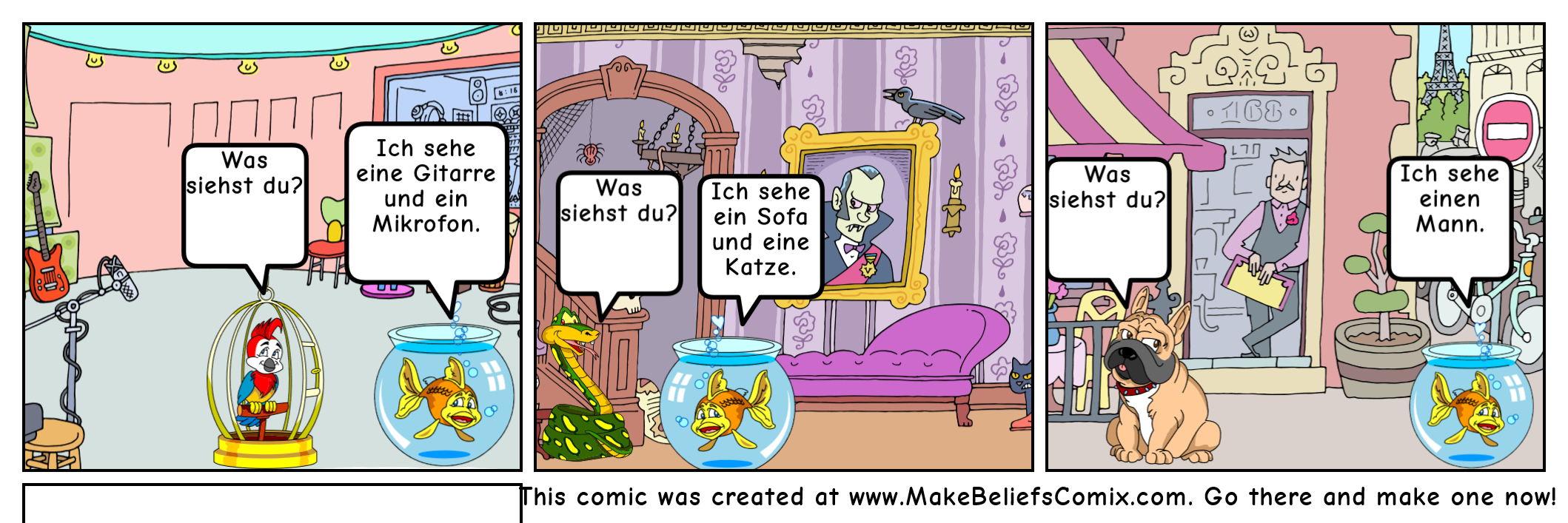
Ex. N: Welche Sprachen sprichst du? Which languages do you speak? Ask your classmates about the following languages. If you don’t speak the language, put the correct form of kein in front of the language. If you speak the language a little, you can add ein bisschen to your answer.
Beispiel: Englisch
A: Sprichst du Englisch? (Do you speak Englisch?)
B: Ja, ich spreche Englisch. (Yes, I speak Englisch.)
ODER
B: Ja, ich spreche ein bisschen Englisch. (Yes, I speak a little Englisch.)
ODER
B: Nein, ich spreche kein Englisch. (No, I speak no Englisch.)
- Chinesisch
- Spanisch
- Französisch
- Japanisch
- Arabisch
- Latein
- Koreanisch
- Portugesisch
- Deutsch
JUST FOR FUN: Match the language to the flag. (Courtesy of Dr. Claudia Kost, University of Alberta.)
Ex. O: Ich spreche Französisch, aber mein Partner spricht Spanisch. Using what you learned about your classmates in exercise N, write a brief paragraph comparing your own language experience to theirs.

Beispiel: Sarah und ich sprechen Englisch. Ich spreche kein Italienisch, aber Sarah spricht sehr gut Italienisch. Philipp spricht…usw.
Quick Review of Verb Conjugation: Try Dr. Claudia Kost’s (University of Alberta) verb conjugation review so that you don’t forget what you’ve learned so far about verb conjugation.
Man vs. der Mann:
To say that people in general do something, you can use the subject man. Man is always lowercase unless it comes at the beginning of the sentence. Don’t confuse it with the word der Mann, which is a specific person. Man will always be conjugated like er/sie/es.

Beispiel:
A: Was isst man bei McDonald’s?
(What do people/you/one/they eat at McDonald’s?)
B: Man isst normalerweise Hamburger und Fritten.
(People/they/one/you normally eat hamburgers and fries.)
Notice that man has a lot of translations in English. It’s also the equivalent of using English “one” instead of “you” in an essay. In German, man doesn’t sound odd. It’s normal to hear it in everyday life. It’s often used to express a generalization about a group of people.

Video. Click to see me reteaching man vs. der Mann.
Ex. P: Was spricht man in…? Using the pronoun man and the stem-changing verb sprechen, ask a partner about where these languages are spoken. Don’t forget to put the verb in second position!
Beispiel: Italien
A: Was spricht man in Italien?
B: In Italien spricht man Italienisch.
- Mexiko
- Saudi-Arabien
- Kanada
- Russland
- Belgien
- Schweden
- Japan
- Brasilien
Ex. Q: Was nimmst du? You are in a restaurant in Germany with several friends. Write a complete sentence, using the stem-changing verb nehmen, to say what they are ordering, aka “taking.” Don’t forget to put the direct object in the accusative case!
Beispiel: Paul/das Schnitzel
→Paul nimmt das Schnitzel.
- ich/die Pizza-Margherita
- wir/der Käsekuchen
- Janina/Fritten mit Mayo
- du/Sushi
- Frau Frommen/eine Portion Spaghettieis
- Maria/Rindsrouladen
- ihr/der Salat
- Niklas und Mirko/Spargelsuppe
Ex. R: Wie wird das Wetter? Use the cues below to say how the weather is changing.
Beispiel: 
→Das Wetter wird sonnig.
(The weather is getting/becoming sunny.)
 3.
3. 
 4.
4. 
Video. Click to see me reteaching how to conjugate “werden”.
Video. Watch Learn German’s video to review how to conjugate stem-changing verbs.

Ex. U: LISTENING PRACTICE: In den Urlaub fahren. Listen to the description of a family’s vacation. You will here the stem-changing verbs fahren, schlafen, essen, several food items, and a description of the weather. Fill in the blanks with the missing words. Then answer the comprehension questions about what you heard/read. (Used with permission from germanlistening.com.)
Ex. V: Artikel. Lesen Sie den Artikel und beantworten Sie die Fragen.
Alles über Stefan
Stefan ist sechsundvierzig Jahre alt. Er kommt aus Stuttgart aber er wohnt und arbeitet in Aachen. Er ist nicht sehr modern aber sehr kompetent. Er liest gern Harry Potter, Herr der Ringe und andere Fantasy-Bücher. Er isst sehr gern Nudeln, Salat und Schnitzel. Er trinkt gern Tee, Mineralwasser und manchmal eine Cola. Stefan sucht immer seine Brille. Es gibt viel in Stefans Haus. Es gibt einen Tisch, ein Sofa, ein Bett, einen Fernseher aber keine Zeitung. Stefan liest keine Zeitung, aber manchmal liest er die Nachrichten im Internet.
Stefans Familie ist sehr groß. Er hat eine Frau und zwei Kinder. Seine Frau arbeitet als Lehrerin. Seine Kinder heißen Katrin und Erick. Sie sind aktiv, athletisch und super intelligent. Erick studiert in England, und Katrin arbeitet in Boston. Katrin hat ein Haus in Boston. Sie liest sehr gern. Sie liest alles—Fantasy-Bücher, Krimis, Science-Fiction…usw. Sie hat ihren Doktortitel. Erick kocht sehr gern. Er kocht gern Gemüse. Manchmal grillt er Fleisch. Erick hat eine Freundin aber Katrin hat keinen Freund. Sie sagt, sie hat keine Zeit für einen Freund.
Stefan hat auch eine Mutter und einen Vater. Seine Mutter heißt Annika und sein Vater heißt Johann. Stefans Eltern sind sehr alt aber gesund. Stefan hat keine Großmutter und keinen Großvater. Sie sind schon lange tot. Stefan hat auch viele Tanten, Onkel, Cousins und Cousinen, aber er kennt sie alle nicht. Seine Familie ist sehr groß.
- Wie alt ist Stefan?
- Was macht Stefan gern?
- Gibt es eine Zeitung bei Stefan zu Hause?
- Wie viele Kinder hat Stefan? Wie heißen sie?
- Warum hat Katrin keinen Freund?
- Beschreiben Sie Stefans Familie!
Ex. W: Nicos Weg. Episode 15: Eine Pizza bitte! Watch episode 15 of Nicos Weg and answer the questions online. You will see the stem-changing verbs nehmen and essen.

https://learngerman.dw.com/en/eine-pizza-bitte/l-37279261#.
Ex. X: Erwischt! You caught these thieves on your security camera cleaning out your house. Call the police and describe what you see (while practicing new vocab and direct objects in the accusative case!)
- Was tragen die Diebe?
- Der Mann trägt ______, ______ und ______.
- Die Frau trägt ______, ______ und ______.
- Was haben sie gestohlen?
- Der Mann hat _____ und ______ gestohlen.
- Die Frau hat _____ und ______ gestohlen.
- Die Katze hat ______ gestohlen.
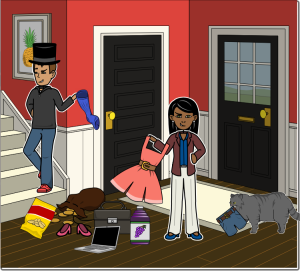
Extra Practice with stem-changing verbs:
- https://www.germanzone.org/stem-changing-verbs-4/.
- https://www.germanzone.org/stem-changing-verbs-3/.








